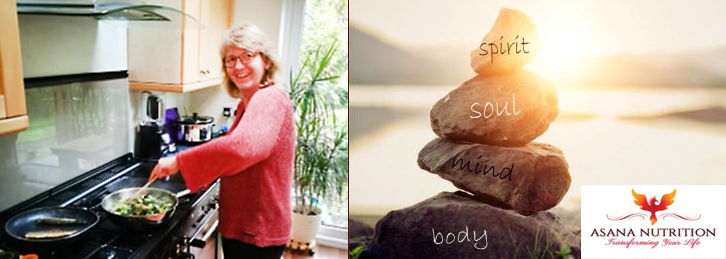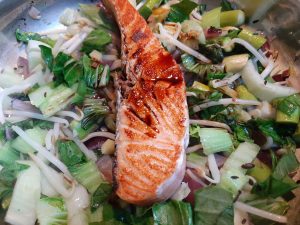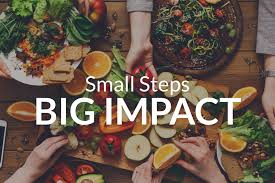
It’s OK Not To Be OK – Isn’t It? Sabine Horner Answers This Question For Us
We’re delighted to have an insight into this question from one of our regular guest writers Nutritional Therapist and Kundalini Yoga Instructor, Sabine Horner. Sabine is based in York.
IT’S OK TO NOT BE OK – UP TO A CERTAIN POINT
I cannot remember how many times I have come across this phrase since I lost my husband in August 2017. Being a member of a group of young widows and widowers, I noticed that it was used a lot when people were too exhausted or overwhelmed by grief to be able to look after themselves properly.
In a way I was fortunate. Only two months into my bereavement, my Ayurvedic doctor warned me that I needed to cook and eat three ‘happy’ (i.e. nourishing) meals every day because I was close to getting severely depressed. Since wise doctors like him are rare, I have made it my new purpose in life to raise awareness of the well-researched yet still largely ignored link between good food and good mood.
But my mission doesn’t stop there. While it is well-known that grief can cause physical symptoms such as difficulty breathing and nausea and mood disorders such as depression, not many health professionals appear to address their root cause – the emotional stress triggered by grief and its huge impact on all parts of the body, including our gut.
Our response to – any types of – stress has not changed since prehistoric times. Back then, it made sense that stress shut down our digestive system so that the blood could be pumped into the heart and the limbs to run away from the saber-toothed tiger.

Unfortunately, our nervous system responsible for this stress response has not caught up with modern-day living and learned to distinguish between real and perceived threats. Therefore, grief also impacts our digestion and consequently, our ability to absorb vital nutrients from the food we eat – if we eat at all!
It should be obvious then that not eating or poor digestion due to high levels of emotional stress will eventually lead to a deficit in the nutrients we need to properly maintain all our body functions. Add to the mix that grieving makes people long for comfort and crave food high in sugar and unhealthy fats and we have all the ingredients for (serious) trouble further down the line.
What many people don’t realise is that our gut is home to over 100 trillion microbes whose survival depends on the food we eat. While our survival depends on a healthy balance between the beneficial and the more harmful microbes that are part of this extremely complex ecosystem.
Thus, when we go for ’comfort’ food such as bread, cheese, crisps or cakes, we end up feeding … the wrong guys. And stress makes them thrive as well.
Emotional stress and the unhelpful eating habits we develop when we are grieving can create a vicious cycle and sustain unhealthy food cravings. Because our gut microbes are constantly talking to the brain and vice versa. And they can pull powerful levers to modify our eating behaviour in their favour. They can make us feel happy or miserable depending on which microbes are dominating in our gut.

If we want to stop this, we need to start feeding the good guys the food they like: fats high in butyrate (such as butter or ghee) and lots and lots of different types of fibre.
‘Awareness is the first step towards change.’ Simply knowing about this connection between our gut and our brain can help us make healthier choices which in turn can help us think more positively.
Here are some simple tips on how you can manage your gut microbes and restore a healthier balance in no time at all:
• Increase the variety of food in your diet to increase the variety of species in your gut. Different species like different food. Diversity is key to stop food cravings and boost your health.
• Gradually increase the amount of fibre you eat (and the amount of fluid you drink). You want the beneficial bacteria to be in the majority to keep the troublesome microbes at bay.
The easiest way to do both is by eating a ‘rainbow’. Simply add more colour to every meal. If you like my Supergreen Stir-Fry recipe, try and play with green veggies one day and add lots of different coloured ones the next (link to the recipe at the bottom).


• Use only natural sweeteners such as raw honey, dates or maple syrup. All of them are rich in minerals and vitamins and, contrary to popular belief, unprocessed honey is good for us; it puts the good guys in the driver’s seat.
• Whenever you feel the need for a snack, go for sweet-tasting fruit such as apples, pears, berries, cherries, apricots, peaches or plums.
• Spice things up! Spices not only add lots of flavour to our meals; they also help improve our digestion and lower the numbers of nasty microbes. My absolute favourites are fennel, cumin, mustard and nigella seeds, fresh ginger and garlic.
• Eat in a stress-free environment and chew your food well. A great way to reduce stress and strengthen our digestion to prevent an explosion of bad guys.
Even the smallest changes to what we eat, when and how can gradually shift the composition and diversity of our gut microbes in our favour. Tiny new habits add up over time and can boost our energy and motivation to make some more changes.

I know from personal experience that grieving can be utterly overwhelming and exhausting. Yet I also know that there is a lot we can do to help us cope so much better with the emotional ups and downs, lack of energy, anxiety attacks or low mood.
In this article, I tried to share some important knowledge to help you take the first step towards regaining control of your mind and your mood so that you can start to rebuild your life. If you feel that you need additional support or would like to learn more about how you can feel more positive again, please do reach out so that I can point you to some complimentary resources I offer to help people on their healing journey through grief.
About Sabine:
Sabine lost her husband to leukaemia while she was retraining to become a nutritional therapist and Kundalini Yoga instructor. You can visit her website or follow her on Facebook or Instagram.
Link to Supergreen Stir-Fry Recipe: https://drive.google.com/file/d/1-uQtYSEa7nDLX7rDOIN47q_guwcVWsiF/view?usp=sharing
